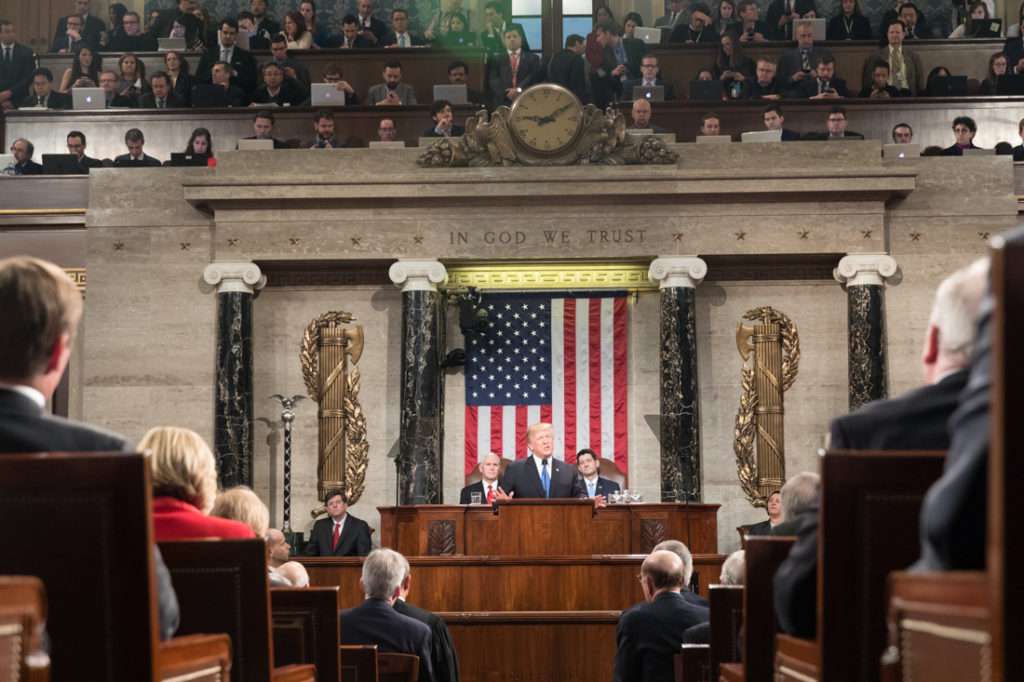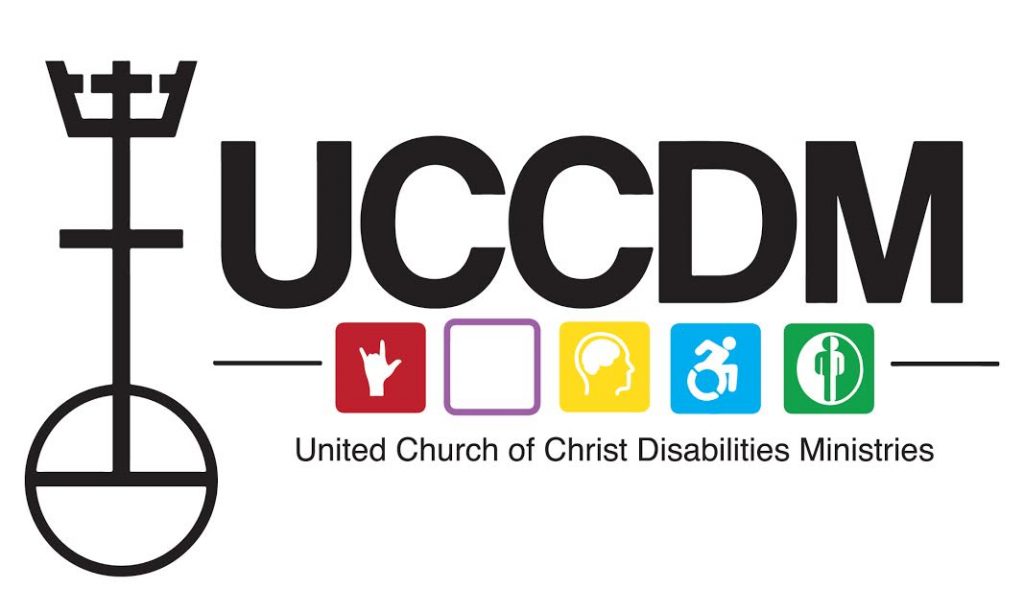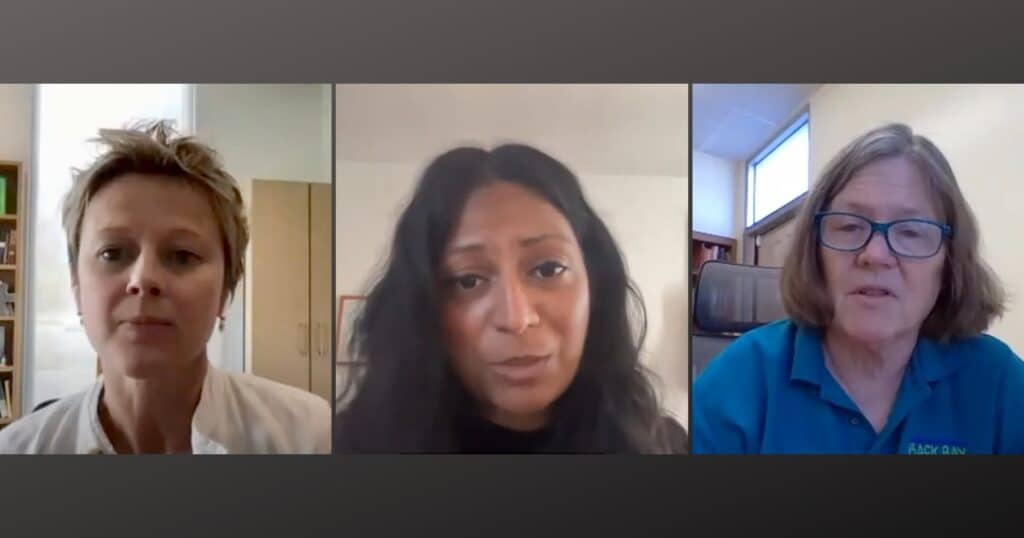UCC leaders respond to first Trump State of the Union Address
 |
| Photo Credit: Official White House Photo by Shealah Craighead |
Calling out “our new American moment,” President Donald Trump, in his first State of the Union address appealed for unity, boasted a strong economy and took aim on immigration. Both his policies and his speech were problematic to United Church of Christ national executives.
“The State of the Union address provides an opportunity for the leader of the free world to be both introspective and visionary, both sensitive and strategic, to confront challenges and to offer hope,” said the Rev. Traci Blackmon, Executive Minister for Justice and Local Church Ministries. “In many ways, President Trump’s speech came closer to fulfilling this presidential role than the rhetoric I have become accustomed to hearing from him. But sadly, setting aside areas of challenge evident in his words, even areas where agreement might be reached must only be received as social commentary. The fact remains that we now have a leader of the free world whose word cannot be trusted. President Donald Trump offers commentary but lacks commitment and because of that, the greatest revelation of last night’s State of the Union address is that the state of our union is unsure.”
Trump, whose approval rating is the lowest of any president at this point in his tenure, offered an address long on accomplishments, short on substance. His eighty minute speech to a joint session of Congress was orchestrated to showcase the ways he and his supporters are working, as he said, “to make America great again.” He took credit for, as he put it, the “biggest tax cuts and reform in American history,” stock market growth, rising wages, and low unemployment.
The president chastised lawmakers about their divisions, took a shot at the National Football League players who have engaged in protest on the field, and implied that the United States will restrict foriegn aid to vulnerable countries, stating that the U.S. should offer assistance to nations “that serve American interests and only go to America’s friends.” Trump also talked his decision on Tuesday to keep prison at Guantanamo Bay open.
“If President Trump wants to be tough on terrorists, he should close the prison at Guantanamo Bay and deprive them of an important recruiting tool,” said the Rev. Ron Stief, director of the National Religious Campaign Against Torture. “It is a moral outrage that the U.S. continues to spend more than $10 million per detainee each year to keep open a prison that is an international symbol of U.S. torture. Calling for indefinite detention without trial is one of the most un-American things I’ve ever heard in a State of the Union address.”
In Trump’s address before lawmakers Tuesday night, there was little information about the administration’s future policy initiatives. The president promised to cut the cost of prescription drugs, saying, “prices will come down.” But he didn’t explain how. He talked about the “scourge” of the opioid crisis, without offering a way to combat it. He called on Congress to produce a bill with a $1.5 trillion investment on infrastructure in some combination of federal, state, local and private sector funding, but didn’t delve into how to build what he called “gleaming new roads, bridges, highways, railways and waterways.”
Trump also didn’t acknowledge the ‘MeToo’ movement, that speaks out against sexual harassment and sexual assault.
But he did challenge Congress to join him in overhauling immigration. Saying “Americans are dreamers too,” Trump introduced his four pillar plan for immigration reform, what he termed a “down the middle compromise” designed to “bring the system into the 21st century.” While holding out a hand to the Dreamers — immigrants brought into this country as children—Trump’s proposal relies on increased funding to expand the border wall, tighter boarder security, limits on family sponsorship, and an end to the diversity visa lottery system; all to keep future immigrants out.
“A speech framed as an appeal to unity was filled with divisive rhetoric on immigrants who were again portrayed as gang members, drug dealers and murderers,” said the Rev. James Moos, Executive Minister for Global Engagement and Operations. “Spending billions of dollars on a wall on our southern border will not make us secure, it will be an ugly scar running the length of our national soul.”
UCC leadership is also concerned about issues Trump did not address.
“About as sedate and restrained as we have seen him, Mr. Trump delivered a State of the Union Address in a manner befitting the office,” said the United Church of Christ General Minister and President John Dorhauer. “His address will give America a much needed opportunity to debate his policies, a rare and much needed respite from the discussions about his history of sexual harassment and misogyny, his racist comments, an ongoing and intensifying investigation into collusion and obstruction of justice, threats of firing those investigating him, and promises of an unprecedented nature to release classified information the department of justice calls dangerously reckless. His demeanor belied these more salient facts about the administration of his duties while in office. Whatever respite comes from this opportunity to discuss his policies will, I fear, prove to be short-lived as the drama that he craves and cultivates will soon overshadow our need to debate substantive matters of politics and policy.”
In response to the State of the Union speech, Global Ministries offers this “State of Our Partners” in which they reflect, in their own words, on the impact of Trump administration policies.
Related News
Rethink Children and Youth Online Summit will delve into future of ministry for younger generations
Children and youth will be the focus of discussion at the Rethink Children and Youth Ministry...
Read MoreEngaging and Inclusive Worship grant: Call for focus group participants
The United Church of Christ National Setting has received a $2,000 grant originating from the...
Read More‘Brave Conversations’: Webinar speakers navigate interfaith relations in time of deep polarization
With the Middle East conflict fueling antisemitic and anti-Muslim rhetoric and violence in the...
Read More


